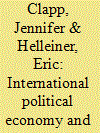|
|
|
Sort Order |
|
|
|
Items / Page
|
|
|
|
|
|
|
| Srl | Item |
| 1 |
ID:
112800


|
|
|
|
|
| Publication |
2012.
|
| Summary/Abstract |
There is a widespread perception that power is shifting in global politics and that emerging powers are assuming a more prominent, active and important role. This article examines the role of emerging powers such as China, India, Brazil and South Africa (BASIC) in climate change politics and the extent to which their rise makes the already difficult problem of climate change still more intractable-due to their rapid economic development, growing power-political ambitions, rising greenhouse gas emissions and apparent unwillingness to accept global environmental 'responsibility'. By reviewing the developments in global climate politics between the 1992 Rio Earth Summit and Rio+20, this article unsettles the image of a clear shift in power, stressing instead the complexity of the changes that have taken place at the level of international bargaining as well as at the domestic and transnational levels. Within this picture, it is important not to overestimate the shifts in power that have taken place, or to underplay the continued relevance of understanding climate change within the North-South frame. Emerging powers will certainly remain at the top table of climate change negotiations, but their capacity actively to shape the agenda has been limited and has, in some respects, declined. Even though emerging powers have initiated and offered greater action on climate change, both internationally and domestically, they have been unable to compel the industrialized world to take more serious action on this issue, or to stop them from unpicking several of the key elements and understandings of the original Rio deal. At the same time, developing world coalitions on climate change have also fragmented, raising questions about the continued potency of the 'global South' in future climate politics.
|
|
|
|
|
|
|
|
|
|
|
|
|
|
|
|
| 2 |
ID:
112801


|
|
|
|
|
| Publication |
2012.
|
| Summary/Abstract |
For the past two decades, scholars of international political economy and the environment (IPEE) have become quite focused on the study of various international cooperative initiatives that seek to link economic and environmental issues in the wake of the 1987 Brundtland Report and the 1992 Rio Earth Summit. This important work has enhanced our understanding of topics such as the economic dimensions of international environmental governance, the environmental activities of international economic institutions and regimes, and new kinds of private international regimes governing the environment-economy interface. This focus of IPEE scholarship has, however, steered attention away from larger structural trends in the international political economy, whose environmental implications are not addressed explicitly by significant international governance arrangements. Three such trends that are deserving of more attention from IPEE scholars include: the globalization of financial markets; the rise of newly powerful states such as China and India in the global economy; and the recent emergence of high and volatile commodity prices. Each of these structural trends-as well as their interrelationships-have important environmental consequences whose closer study enhances our understanding of the relationship between the international political economy and the environment. Their study also encourages scholars to widen their focus beyond treaties, institutions and regimes to examine broader global economic structures and processes, and the power relationships within them, in an interdisciplinary manner that can draw inspiration from the pioneers of the field of international political economy from the 1970s.
|
|
|
|
|
|
|
|
|
|
|
|
|
|
|
|
|
|
|
|
|